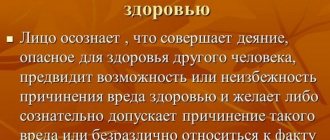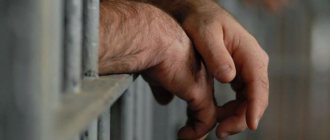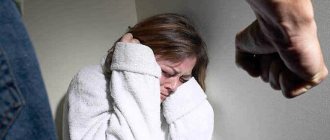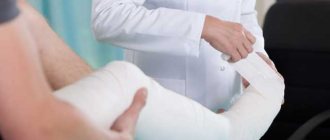1. Intentional infliction of slight harm to health, causing short-term health disorder or minor permanent loss of general ability to work, -
shall be punishable by a fine in the amount of up to forty thousand rubles, or in the amount of the wages or other income of the convicted person for a period of up to three months, or by compulsory labor for a term of up to four hundred eighty hours, or by corrective labor for a term of up to one year, or by arrest for a term of up to four months.
2. The same act committed:
a) for hooligan reasons;
b) for reasons of political, ideological, racial, national or religious hatred or enmity, or for reasons of hatred or enmity towards any social group;
c) using weapons or objects used as weapons;
d) in relation to a person or his relatives in connection with the performance of official activities by this person or the performance of public duty, -
shall be punishable by compulsory labor for a term of up to three hundred sixty hours, or correctional labor for a term of up to one year, or restriction of liberty for a term of up to two years, or forced labor for a term of up to two years, or arrest for a term of up to six months, or imprisonment for a term of up to two years.
- Article 114. Causing grievous or moderate harm to health by exceeding the limits of necessary defense or by exceeding the measures necessary to detain a person who has committed a crime
- Article 116. Beatings
Commentary to Art. 115 of the Criminal Code of the Russian Federation
The signs of the object and the victim as part of the intentional infliction of minor harm to health are identical to the above-discussed signs of the object of the main structure of causing serious harm to health (see commentary to Article 111 of the Criminal Code of the Russian Federation).
The objective side consists of the act in the form of action or inaction and the causally associated consequences in the form of minor harm to health.
Harm to health is considered minor if two signs are present:
a) if it causes a short-term health disorder lasting no more than twenty-one days, or
b) entails a slight permanent loss of general ability to work in an amount not exceeding ten percent.
Practice recognizes as minor harm to health: weakened vision or hearing, loss of one finger on the hand (except for the index and thumb), impaired grasping ability of the left wrist, etc.
Causing harm to health that had immediate consequences, was accompanied by health problems for less than six days and did not lead to minor loss of ability to work (for example, multiple abrasions, bruises, small superficial wounds) may be qualified under Art. Art. 116, 117 of the Criminal Code of the Russian Federation.
Minor harm to health may be an element of the objective side of another crime (for example, robbery, rape, etc.), in this case it does not receive an independent legal assessment. Likewise, the infliction of minor harm does not require independent qualification if, along with it, in the process of using violence, the victim was inflicted with harm of a different degree of severity.
The subjective side of the crime is characterized by guilt in the form of direct or indirect intent. A person is aware of the public danger of causing minor harm to health, foresees the possibility or inevitability of the consequences and desires (with direct intent) or consciously allows or is indifferent to the fact of causing minor harm to health (with indirect intent). The motives and purposes of the crime (except for those specified in Part 2 of Article 115 of the Criminal Code of the Russian Federation) do not affect the qualifications of the crime.
When qualifying an act, the content and direction of the intent of the perpetrator must be accurately established. If the perpetrator had the intention to cause more serious harm to health or death to the victim, but the desired consequences did not occur due to circumstances beyond his control and the victim was actually caused minor harm to health, the act is qualified in accordance with the direction of intent as an attempt to commit a more serious crime.
Careless infliction of minor bodily harm does not entail criminal liability.
The general subject of the crime is a physically sane person who has reached the age of sixteen.
The qualifying signs of intentional infliction of minor harm to health (Part 2 of Article 115 of the Criminal Code of the Russian Federation) are similar to the corresponding signs of murder discussed above (see commentary to Article 105 of the Criminal Code of the Russian Federation).
Legal basis for compensation for damage to health caused by a crime
The main issues relating to compensation for harm caused by damage to health are regulated by the Civil Code of the Russian Federation.
According to Art. 1085 of the Civil Code of the Russian Federation, when a citizen is injured or otherwise damaged his health, the victim’s lost earnings (income) that he had or could definitely have, as well as additional expenses incurred due to damage to health, including expenses for treatment, additional food, purchase of medicines, prosthetics, outside care, sanatorium treatment, purchase of special vehicles, preparation for another profession, if it is established that the victim needs these types of help and care and is not entitled to receive them free of charge.
Compensation for material and moral damage from a crime is also regulated by the civil legislation of the Russian Federation.
Judicial practice under Article 115 of the Criminal Code of the Russian Federation
Ruling of the Supreme Court of the Russian Federation dated February 21, 2017 N 5-UD17-9
By the verdict of the Tushinsky District Court of Moscow dated May 12, 2009, I. (previously convicted) was convicted: under Part 1 of Art. 115 of the Criminal Code of the Russian Federation - to six months of correctional labor with the withholding of 10% of wages to the state; according to paragraphs “b”, “c”, part 2 of Art. 131 of the Criminal Code of the Russian Federation - to five years in prison; according to paragraphs “b”, “c”, part 2 of Art. 132 of the Criminal Code of the Russian Federation - to five years in prison. Based on Part 3 of Art. and clause “c” of Part 1 of Art. According to the Criminal Code of the Russian Federation, for the totality of crimes, by partial addition of punishments, I. was finally sentenced to seven years in prison.
Resolution of the Presidium of the Supreme Court of the Russian Federation dated March 14, 2018 N 306P17
Abdurakhmonov Saidmurod Bekovich, ... convicted on January 20, 2010 under clause “d”, part 2 of art. 161, part 1 art. 161, part 1 art. 115 of the Criminal Code of the Russian Federation to 2 years 6 months in prison, released on July 18, 2011 after serving his sentence, was detained on August 16, 2012 in accordance with Art. Art. 91, 92 of the Code of Criminal Procedure of the Russian Federation on suspicion of committing a crime under paragraph “b” of Part 4 of Art. 132 of the Criminal Code of the Russian Federation.
Resolution of the Presidium of the Supreme Court of the Russian Federation dated 06.06.2018 N 60P18
Ionov was acquitted: under Part 1 of Art. 210, according to Part 2 of Art. 213, paragraphs “g”, “e”, part 2 of Art. 112 of the Criminal Code of the Russian Federation (on charges of committing crimes against the victims of G.V.T.K. under “a” part 3 of Article 163 of the Criminal Code of the Russian Federation (on charges of committing a crime against M.) under paragraph “a” part 2 of Article 115 of the Criminal Code of the Russian Federation (on charges of committing a crime against N.) under paragraph “a” of Part 2 of Article 116 of the Criminal Code of the Russian Federation (on charges of committing a crime against Ya. on October 29, 2013), on clause "a" part 3 of article 111 of the Criminal Code of the Russian Federation (on charges of committing a crime against K.) under part 2 of article 213, clause "a" part 2 of article 115 of the Criminal Code of the Russian Federation (on charges of committing crimes against T.) on the basis of clause 2, part 1, article 24 of the Code of Criminal Procedure of the Russian Federation, clause 3, part 2, article 302 of the Code of Criminal Procedure of the Russian Federation due to the lack of corpus delicti, he is recognized as having the right to rehabilitation (with the exception of acquittal under Part 1 Article 210 of the Criminal Code of the Russian Federation).
Appeal ruling of the Judicial Collegium for Criminal Cases of the Supreme Court of the Russian Federation dated 06.06.2018 N 44-APU18-8sp
Convict Apet asks to reclassify her actions to clause “c” of Part 2 of Art. 115 of the Criminal Code of the Russian Federation or reduce the punishment to the minimum under the sanction of Part 2 of Art. 105 of the Criminal Code of the Russian Federation; notes that she caused a wound to the victim, which qualifies as minor harm to health, and was not involved in causing other bodily injuries;
Appeal ruling of the Judicial Collegium for Criminal Cases of the Supreme Court of the Russian Federation dated June 27, 2018 N 53-APU18-7
clause "c" part 2 art. 115 of the Criminal Code of the Russian Federation to 1 year of imprisonment, on the basis of Part 2 of Art. The Criminal Code of the Russian Federation for the totality of crimes by partial addition of punishments imposed 8 years and 1 month of imprisonment to be served in a high-security correctional colony.
Appeal ruling of the Judicial Collegium for Criminal Cases of the Supreme Court of the Russian Federation dated June 27, 2018 N 59-APU18-4
sentenced to imprisonment: - under paragraph “c” of part 2 of article 115 of the Criminal Code of the Russian Federation for 8 months; - under paragraph “g” of Part 2 of Article 105 of the Criminal Code of the Russian Federation for 17 years; - under paragraph “d” of part 2 of article 158 of the Criminal Code of the Russian Federation for 2 years.
Appeal ruling of the Judicial Collegium for Criminal Cases of the Supreme Court of the Russian Federation dated July 26, 2018 N 30-APU18-3
Regarding the traces of D.’s blood found on the clothes of deceased A. and the arguments of Z.B. Batchaev. that D. strangled A., these issues were also carefully checked during the preliminary investigation, and on June 3, 2017, a decision was made to terminate the criminal prosecution of D. under Part 1 of Art. 115 of the Criminal Code of the Russian Federation for the expiration of the statute of limitations (vol. 9, pp. 124 - 127), with which the court of first instance agreed, refusing the petition of the representative of the victims A. to return the criminal case to the prosecutor on these grounds (vol. 12, pp. 143).
Appeal ruling of the Judicial Collegium for Criminal Cases of the Supreme Court of the Russian Federation dated August 14, 2018 N 72-APU18-11
Convicted under paragraph “g” of Part 2 of Art. 105 of the Criminal Code of the Russian Federation to 16 years in prison with restriction of freedom for one year, under paragraph “c” of Part 2 of Art. 115 of the Criminal Code of the Russian Federation to one year in prison. In accordance with Part 3 of Art. The Criminal Code of the Russian Federation for the totality of crimes by partial addition of punishments imposed 16 years and 6 months of imprisonment with restriction of freedom for one year.
Appeal ruling of the Judicial Collegium for Criminal Cases of the Supreme Court of the Russian Federation dated August 30, 2018 N 11-APU18-12
actions of Arzamasov A.I. in relation to Ya. under paragraph “a” of Part 2 of Art. 116 of the Criminal Code of the Russian Federation as beating that caused physical pain, but did not entail the consequences specified in Art. 115 of the Criminal Code of the Russian Federation, in relation to L. under clause “a”, part 2 of Art. 115 of the Criminal Code of the Russian Federation as intentional infliction of minor harm to health;
Cassation ruling of the Judicial Collegium for Criminal Cases of the Supreme Court of the Russian Federation dated August 30, 2018 N 13-UD18-9
Alekseev Alexander Sergeevich, ... convicted: 1) July 8, 2013 under clause “a”, part 2 of art. 213, paragraph “a”, part 2, art. 116 of the Criminal Code of the Russian Federation to 2 years of suspended imprisonment with a probationary period of 1 year; On June 9, 2014, released from punishment under paragraph “a” of Part 1 of Art. 213 of the Criminal Code of the Russian Federation on the basis of an amnesty act, finally assigned under paragraph “a” of Part 2 of Art. 116 of the Criminal Code of the Russian Federation, punishment in the form of 6 months of correctional labor, suspended with a probationary period of 1 year; 2) October 3, 2014 under clause “a”, part 2 of art. 115 of the Criminal Code of the Russian Federation to 6 months of correctional labor with the deduction of 10% of earnings to the state income monthly;
Appeal ruling of the Judicial Collegium for Criminal Cases of the Supreme Court of the Russian Federation dated September 4, 2018 N 44-APU18-11
Convicted under paragraph “a” of Part 2 of Art. 105 of the Criminal Code of the Russian Federation to imprisonment for a term of 18 years, with restriction of freedom for 1 year, under paragraph “c” of Part 2 of Art. 115 of the Criminal Code of the Russian Federation to corrective labor for a period of 9 months with the deduction of 10% of wages monthly to the state income.
Compensation for moral damage for life and health: ways to solve problems
Discussing the problems of law enforcement practice in the field of compensation for moral damage for causing harm to human health and life, I would like to draw attention to the most pressing ones.
The first problem : the amounts of compensation collected by the courts differ significantly, and there is no uniform approach to their determination. Thus, one judge can exact compensation of 5,000 rubles in favor of relatives for the death of a person, another – 8.5 million rubles. Such a significant variation in the amount of amounts collected does not create certainty for the victim and the harm-doer.
The second problem is the difficulty of proving the severity of the victim’s moral suffering. This leads to the fact that the courts do not give them a proper legal assessment.
According to the Resolution of the Plenum of the Supreme Court of the Russian Federation of January 26, 2010 No. 1 “On the application by courts of civil legislation governing relations under obligations resulting from harm to life or health,” when determining the amount of compensation, courts must take into account the individual characteristics of the person who suffered harm, the degree of guilt of the offender and other noteworthy circumstances of each case.
However, in practice, everything is different - the courts approach the issue of determining the amount of compensation for moral damage formally, without taking into account the degree of moral suffering of a particular victim. In my legal practice, there was a case (2018) when a music teacher, after a broken arm and a traumatic brain injury received as a result of an accident, became professionally unsuitable and was forced to leave her job. She will need to learn a different profession and radically change her life. In this case, the moral suffering of the victim is not equal to the suffering of another professional who does not require virtuosity of hands.
The third problem is related to the fact that those who cause harm to life and health often evade paying compensation ordered by the court and compensation for moral damage. In my line of work in the Union of Pedestrians, I often encounter cases of harm to the health of pedestrians due to the fault of the driver. The victim may be the only breadwinner in the family. As a result, he ends up in the hospital, incurs additional costs for treatment, loses his ability to work, etc. In this case, the only source of income for the victim’s family may be only the amounts collected from the culprit of the accident for compensation for damage to health and compensation for moral damage. If the person at fault for the accident evades payment, the victim finds himself in an even more difficult financial situation.
This situation arose with three pedestrians whose health was seriously harmed as a result of an accident. One of them, in particular, lost the ability to move. The court ordered damages in the amount of about 800 thousand rubles, but the culprit did not reimburse this amount due to lack of funds.
Today, willful defaulters are not liable for evading the execution of court decisions. The only thing that bailiffs can do is to apply restrictive measures against these persons: on traveling abroad, on the debtor using special rights. However, these measures, as practice shows, do not motivate debtors to pay the awarded amounts - some do not travel abroad at all, others do not have a driver’s license or have already been deprived of them, etc. In addition, if the debtor does not have property that can be foreclosed on, and all measures taken by the bailiff, permitted by law, to find his property are unsuccessful, the writ of execution will be returned to the victim.
The fourth problem is the difficulty of the judicial process for the victims themselves. When the expected amount of compensation is low, victims often refuse to go to court due to the upcoming costs of a lawyer and the need to attend numerous court hearings. For this reason, people who have suffered minor or moderate harm to their health are often left without compensation.
I believe that the above problems will be solved by introducing changes to the legislation regulating this area, as well as clarifications from the RF Armed Forces.
Thus, in order to eliminate the variation in the amount of compensation, it is advisable, in my opinion, to establish a minimum amount based on the severity of the harm to health and the form of guilt of the harm-doer (intention, negligence, lack of guilt). The minimum amount of compensation for moral damages should depend on the degree of physical suffering.
This minimum amount is then increased by compensation for moral suffering, assessed by the court individually for each victim according to established criteria.
Thus, for the minimum compensation amount:
bodily injury – A (amount), minor harm to health – B (amount), moderate harm to health – C (amount), serious harm to health – D (amount), death – E (amount).
The form of guilt will act as an increasing coefficient (for example, absence of guilt - 1, negligence - 1.5, intent - 2).
Let's look at an example. There was a collision with a pedestrian, causing grievous bodily harm, the driver was not at fault.
The amount of compensation in this case will be: D * 1 = D rub. for physical suffering.
Criteria above the minimum should also be established to determine the degree of moral suffering of the victim.
It is necessary to involve specialists in the field of psychology and psychiatry who will be able to develop general criteria for determining the severity of moral suffering and its duration, which will subsequently make it possible to establish the monetary amount of compensation for moral suffering.
To solve the problem of the difficulty of proving moral suffering, new clarifications from the Plenum of the Supreme Court are needed, establishing criteria for assessing the degree of physical and moral suffering (for example, how the life of the victim has changed after causing harm to health, the nature of the relationship between the victim, relative and deceased, etc.), binding the courts when considering this category of cases, evaluate each criterion and reflect the assessment in the decision, as well as provide for the possibility of conducting a (forensic) psychological examination.
To guarantee the rights of victims to receive amounts collected by the court for compensation for harm to health and life and compensation for moral damage, it is necessary to introduce administrative and criminal liability for evasion of payment of compensation, by analogy with non-payment of funds for the maintenance of children and disabled parents (Article 5.35.1 of the Code of Administrative Offenses of the Russian Federation, 157 of the Criminal Code of the Russian Federation).
In addition, when establishing the minimum amount of compensation for moral damage in connection with personal injury, it is necessary to include these disputes (if the claims amount to no more than 500 thousand rubles) in the category of cases for which court orders are issued. The victim will be able to recover minimum compensation without participating in court hearings. To make the calculation, the court will only need a medical examination to determine the degree of harm to health and an official’s act (judicial act) on bringing or not bringing the harm-doer to justice.
I believe that the proposed measures will help ensure that the victim receives decent, rather than nominal, compensation for moral damage.
The victim and the tortfeasor, knowing the minimum amount of compensation and the criteria influencing its increase, will thereby be motivated to enter into an out-of-court agreement (which can be certified by a notary). In this case, there will be no need to go to court, since the amount will be determined. At present, pre-trial resolution of disputes regarding the amount of compensation for moral damage is unlikely, since the parties cannot agree due to the large spread between the minimum and maximum compensation - the victim expects more and goes to court, the tortfeasor does not pay before the trial, because he hopes that the court will charge less. If the amount is certain, it will become unprofitable for them to start a lawsuit and bear the corresponding costs.
In addition, in the case of notarization of an agreement, if it is not fulfilled, the victim can contact a notary to make a writ of execution, which is equivalent to a writ of execution and will become the basis for initiating enforcement proceedings against the defendant without a trial.
The introduction of a minimum amount of compensation will also make it possible to issue a court order for this category of claims not exceeding 500 thousand rubles, which will also significantly relieve the workload of the courts. To do this, the victim will only need to attach to the application a forensic medical examination report and documents confirming the presence or absence of guilt.
In conclusion, I note that the threat of real imprisonment in case of malicious, without good reason, non-payment of the awarded compensation for harm to health and life, as well as compensation for moral damage, will serve as motivation for the execution of court decisions.
How to get compensation through the court: step-by-step instructions
Of course, by filing a civil claim in court, you can significantly increase your chances of receiving moral compensation . But we should not neglect pre-trial methods of conflict resolution. To begin with, you can submit a written claim to the culprit , which states the amount of moral damage and the deadlines for compensation.
If the pest ignores the opportunity to voluntarily compensate for moral suffering, you can safely go to court . Where to begin? Of course, with drawing up a statement of claim.
General rules for drawing up a claim can be found in Articles 131, 132 of the Code of Civil Procedure of the Russian Federation. It should contain:
- Full name, addresses and telephone numbers of the plaintiff and defendant;
- the essence of the issue (that is, the situation of mild harm is described and what physical and moral suffering the victim felt);
- provide factual evidence justifying that damage to health has been caused (conclusion of an independent medical examination), receipts for payment for treatment at the clinic, medications, appointments with doctors, psychoanalysts, etc.;
- cite specific articles of laws confirming the legal position of the plaintiff (on moral damage from the Civil Code of the Russian Federation, or from the Code of Administrative Offenses of the Russian Federation, if an administrative offense has been committed, etc.);
- a specific request to the court: “to recover from the Defendant an amount of moral damage in such and such an amount”;
- an appendix listing all attached supporting documents;
- date and signature of the plaintiff or his representative by proxy.
The claim is filed in the district court at the place of residence of the plaintiff or defendant. If the application meets the requirements, the court office accepts it and forwards it to the judge. He, in turn, schedules a preliminary hearing , and then the main one.
It is better to immediately apply to hear witnesses who can confirm that it was morally difficult for him after the damage to his health. It is impossible to prove without supporting documents.
If both evidence is sufficient, there is every chance of winning the case.
The consideration of the claim ends with a court decision in favor of one of the parties. The limitation period does not apply to claims for causing damage to the life and health of a citizen (Article 208 of the Civil Code of the Russian Federation).
But still, this claim can only be made for the last 3 years that preceded the day the claim was filed. That is, the victim will be able to receive compensation only within a three-year period.
Information: before filing a claim, you must pay a state fee according to the details of the court where the application is being submitted.
The amount of state duty for such cases is 300 rubles (Part 3 of Article 333.19 of the Tax Code of the Russian Federation).





